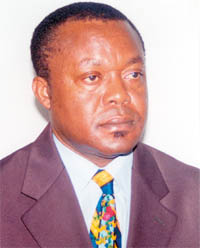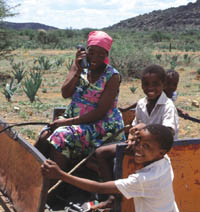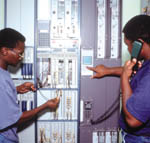From the missing link to the digital divide
Taking stock
 William S. Tallah William S. Tallah
Senior Telecommunications Engineer
Ministry of Posts and Telecommunications
Cameroon
As Africa and the rest of the
international community were saluting the peaceful transition of power in
Ghana in 2001, United Nations Secretary-General, Kofi A. Annan, a fervent
advocate for the development of information and communication technologies (ICT)
in Africa, was pointing at the tiny mobile phone as one of the agents
contributing to the entrenchment of democratic values in the continent. “Election
monitors in remote locations”, he indicates, “are using mobile phones to
communicate instant results from polling stations”, thus thwarting attempts
to alter the will of the people.
In South Africa, the biggest powerhouse in the continent’s
ICT drive, police zero in on a suspected murderer thanks to the victim’s mobile
phone. And in the sprawling suburbs of Benin’s capital city Cotonou, a
motor cycle taxi rider answers a client’s call from his mobile phone. For many
city dwellers across Africa today, from north to south and east to west, this
newest comer is opening a window, at least, if not a door of opportunities for
them. But these vivid pictorial accounts tell only part of the complex story of
the dire straits in which the continent finds itself at the beginning of the
21st century as far as ICT is concerned.
The phrase, “the missing link”, came to prominence in
telecommunication circles with the publication of the Maitland report in the
1980s. It was referring, as well as drawing attention, to the urgent need for a
coordinated effort to redress the huge discrepancy in the number of
fixed-telephone lines between developed and developing countries. Today, almost
20 years after that rallying call for action, a new phrase, “bridging the
digital divide”, has taken over the discourse. Regrettably enough, it points
yet to another gulf between the developed and developing countries as
telecommunications break fresher grounds.
Targets
The International Telecommunication
Union’s Buenos Aires Action Plan (BAAP) is part of the teledensity improvement
drive underscored by The Missing Link report. Five telephone lines
per 100 people in urban areas and one telephone to every 10 000 people in rural
areas, were the goals set for developing countries. Relative progress has been
made; but with only 35.3 million phone lines (both fixed and mobile) today for
850 million people, Africa has under performed.
Internet access and the acquisition and use of mobile
phones are two trends offering a response to bridging the digital divide
campaign in Africa. Last year the continent had 15.5 million mobile phones and
4.4 million Internet users. Huge as they may appear, these figures literally
pale in significance on a global scale. For instance Africa, which is home to 10 per cent of the world’s population, has about 1 per cent of Internet
users. Without set goals and targets, we may simply comfort ourselves into
inaction.

Four priority areas, namely political will, infrastructure, human resources
development and cost of services, merit particular attention for ICT take-off in Africa

|
 Back to basics Back to basics
The African telecommunications
landscape of 2002 compares somehow differently from what it was in the 1980s
when the Maitland report was published. The number of telephone lines has
increased, government telecommunication monopolies of the time have made way in
most countries to a number of private sector companies, national regulatory
entities have been created and the Internet is now available to the general
public. These are important developmental milestones which are rightly a
source of satisfaction. But compounded in some of these positive developments
are a number of worrisome trends which will determine whether Africa remains
where the Maitland report found it or whether it moves along with the rest of
the world.
Four priority areas, namely political will, infrastructure,
human resources development and cost of services, merit particular attention for
ICT take-off in Africa.
The political will and infrastructure top the list as
an acknowledgement of the pivotal position they occupy in the entire process.
Infrastructure and human resources development constitute the fundamental
building blocks for any development in the ICT sector. The wide range of
innovative products inundating the ICT market today, no matter how efficient and
promising they are, will not deliver their full potential for Africans if the
continent’s infrastructural base is not substantially developed.
Examples of different ways on how poor infrastructure is
already holding back users in Africa abound. For most mobile phone users in
the developed world today, receiving or making phone calls is becoming the
secondary use of that gadget. It is replacing the credit card and is fast
becoming the instant television receiver and so on.
The seriousness of the setback caused by poor infrastructure
is even greater when one takes a careful look at high end uses and applications.
With a shortage of doctors and teachers across the continent, one would rightly
say that the very revolutionary distant surgery and the relatively older
application, distance learning, are the magic formulas for African countries.
That surgical operation will not be done from a cell phone; nor will that
lecture be delivered from the street. The back to basics principle in this
case, is a wake up call that without a serious rededication to the development
of infrastructure, Africa’s dream for a piece of the pie or the sky, will collapse
like a pack of cards.

The back to basics principle is a wake up call that without a serious rededication to the development of
infrastructure, Africa’s dream for a piece
of the pie or the sky, will collapse like a pack of cards
|
 As we move from the fixed-line era to ICTs, the demands in
human resources development are increasing tremendously both for users and
professionals. While there is literally no learning for someone to use a fixed
telephone, manipulating the mobile phone is already a big challenge, especially
in Africa where levels of technology acquaintance are rather low. The Internet
may have all the information in the world, but it requires some ability to read
and write in order to operate and manipulate a complex machine to find out what
one is searching for. National incentives, designed to keep ICT experts are
paramount. The loss of a skilled workforce is one of the biggest challenges
facing Africa today; and it is most acute in the ICT sector. Creating an
environment conducive for its professionals to learn, experiment and exploit
their potential to the full is, therefore, important. Africa’s stifling work
and political environments have pushed some of its finest professionals into a
search for greener pastures.
As we move from the fixed-line era to ICTs, the demands in
human resources development are increasing tremendously both for users and
professionals. While there is literally no learning for someone to use a fixed
telephone, manipulating the mobile phone is already a big challenge, especially
in Africa where levels of technology acquaintance are rather low. The Internet
may have all the information in the world, but it requires some ability to read
and write in order to operate and manipulate a complex machine to find out what
one is searching for. National incentives, designed to keep ICT experts are
paramount. The loss of a skilled workforce is one of the biggest challenges
facing Africa today; and it is most acute in the ICT sector. Creating an
environment conducive for its professionals to learn, experiment and exploit
their potential to the full is, therefore, important. Africa’s stifling work
and political environments have pushed some of its finest professionals into a
search for greener pastures.
Africa is gradually accessing ICT thanks to huge financial
investments mainly by foreign companies. There is however, the danger that the
situation of a few well-to-do, high-income city dwellers may be mistaken for a
typical scenario. Far from it! Keen observers of the African ICT sector are
already pointing to what they call “high-tech elitism” in reference to the
handful of wealthy people who are accessing and using more and more services as
opposed to the vast majority who cannot afford the barest minimum.
Blame is apportioned to the high cost of services for the
huge divide among users within countries. The promise that price erosion will
make cost marginal, as competition is promoted by breaking government
monopolies, is not yet a reality in many countries. Instead, prices of services
have shot up, forcing some former users off line. If this situation persists,
many will loose faith in the sector’s market-oriented reforms being backed and
promoted by the World Bank and the International Monetary Fund (IMF).
The wave of privatizations witnessed in many African
countries have been misconstrued in some cases as the “death of government”.
In the particular case of Africa, and in the light of this submission, it is
nothing but a redefinition of roles. From infrastructure through financing to
human resources development, governments will have to play a very important role
for the continent to turn around its fortunes. Learning to define its new role
and exploring ways of interacting better with the other stakeholders is critical
for success.

For Africa, the stakes are extremely high and the outcome of WTDC–02
will be a litmus test for international cooperation in shaping and bridging
the digital divide
|
 Conclusion Conclusion
In this goal-oriented age and in
the fast-paced ICT sector in which we operate, the balance sheet of the “Missing
Link” and its sister concept, “bridging the digital divide” is dismal,
especially for Africa. There is very little to show to match the rhetoric,
despite the huge investments that have been sunk in the process. Apportioning
blame is the easy way out when confronted with failure in an endeavour involving
many players. The difficult but noble thing to do in such a situation is an
introspective assessment, where each player seeks to find out where it went
wrong.
At this critical juncture, it is imperative for Africa to
take this painful path in its quest for a brighter tomorrow. In carrying out its
own self-assessment, African governments, telecommunication organizations and
entrepreneurs, must acknowledge the valuable assistance from the
international community. It must take stock of the wasted opportunities but
above all, it must nurture and consolidate some of the new experiments in
cooperation emerging on the continent with the ICT revolution.
Home-grown business initiatives and intra African ventures
may compare poorly vis-ŕ-vis multinational companies investing in the
ICT sector. They deserve a chance to prove their case since they have never even
had the benefit of the doubt. ITU is pointing the way forward as it is already
incorporating into its projects some of the telecommunication aspects of the
New Partnership for Africa’s Development (NEPAD), a plan drawn up by three
African leaders — President Thabo Mbeki of South Africa, President Olusegun
Obasanjo of Nigeria and President Abdoulaye Wade of Senegal.
Such political will and vision is a strong signal of the
direction the rest of Africa should be heading. For Africa, the stakes are
extremely high and the outcome of the WTDC–02 will indeed be a litmus test for
international cooperation in shaping and bridging the digital divide.
|
 William S. Tallah
William S. Tallah

 Back to basics
Back to basics

 As we move from the fixed-line era to ICTs, the demands in
human resources development are increasing tremendously both for users and
professionals. While there is literally no learning for someone to use a fixed
telephone, manipulating the mobile phone is already a big challenge, especially
in Africa where levels of technology acquaintance are rather low. The Internet
may have all the information in the world, but it requires some ability to read
and write in order to operate and manipulate a complex machine to find out what
one is searching for. National incentives, designed to keep ICT experts are
paramount. The loss of a skilled workforce is one of the biggest challenges
facing Africa today; and it is most acute in the ICT sector. Creating an
environment conducive for its professionals to learn, experiment and exploit
their potential to the full is, therefore, important. Africa’s stifling work
and political environments have pushed some of its finest professionals into a
search for greener pastures.
As we move from the fixed-line era to ICTs, the demands in
human resources development are increasing tremendously both for users and
professionals. While there is literally no learning for someone to use a fixed
telephone, manipulating the mobile phone is already a big challenge, especially
in Africa where levels of technology acquaintance are rather low. The Internet
may have all the information in the world, but it requires some ability to read
and write in order to operate and manipulate a complex machine to find out what
one is searching for. National incentives, designed to keep ICT experts are
paramount. The loss of a skilled workforce is one of the biggest challenges
facing Africa today; and it is most acute in the ICT sector. Creating an
environment conducive for its professionals to learn, experiment and exploit
their potential to the full is, therefore, important. Africa’s stifling work
and political environments have pushed some of its finest professionals into a
search for greener pastures.

 Conclusion
Conclusion